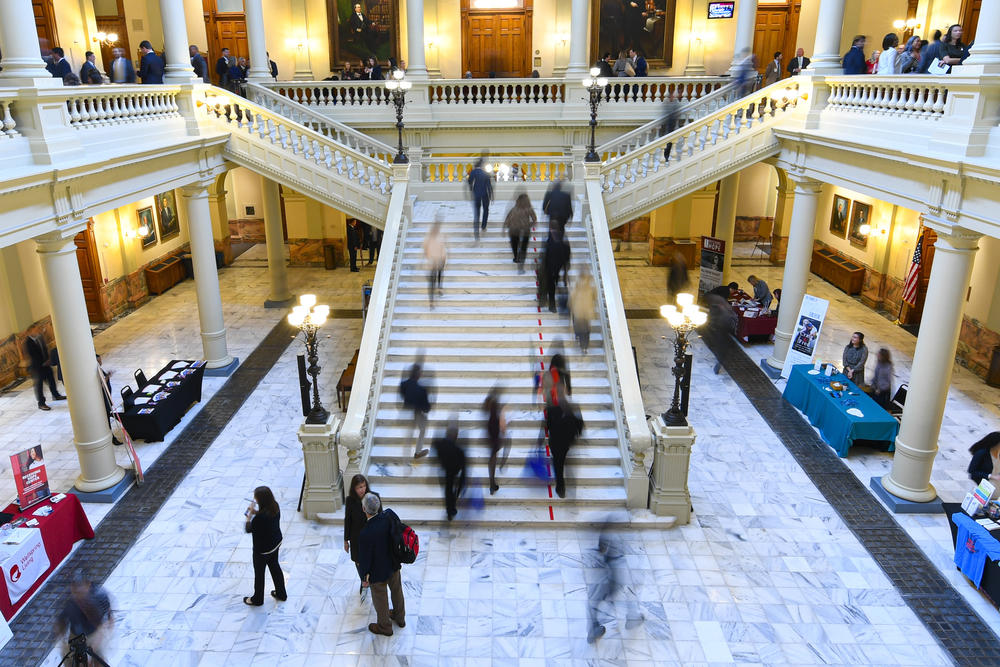Section Branding
Header Content
What's At The Top Of The Docket For Georgia Legislators This Session
Primary Content
Georgia lawmakers gathered under the Gold Dome for the first day of the 2020 legislative session Monday.
House Speaker David Ralston said last week he expects this year's session will largely focus on balancing the state's $27.5 billion budget.
Lawmakers could also consider legislation allowing people to vote on a constitutional amendment in November on whether to legalize gambling among other measures.
GPB's Rickey Bevington sat down with the host of Political Rewind, Bill Nigut to discuss what's at the top of the legislative docket this year.
This conversation has been edited for clarity and conciseness.
Bevington: Let's start, of course, with the big issue: the budget and proposed cuts. How could these cuts impact Georgians?
Bill Nigut: They could impact any number of services. We don't know which services at this point are likely to be cut because that's going to be part of a long negotiation between members of the House and Senate and the Governor's office. In fact, that's one of the reasons that legislators are a little bit unhappy about the way the governor is approaching this.
Speaker David Ralston said in an interview last week it's easy for people to talk about cutting the budget, but when they see that their programs are going to be cut, the legislators aren't quite as happy. We'll have to wait and see how the services to people like you and me and your listeners are going to be affected.
Bevington: Lawmakers will be discussing an income tax cut from 5.75% to 5.5%. To do that, they need to mandate further state budget cuts. Why do all of this during a great economy?
Nigut: Well, in part because when Governor Kemp first proposed these two separate [state budget] cuts, 4% in the first year, 6% now in the new fiscal year coming up in the summer. At that point, he saw that the Georgia economy was starting to slow down, even though the national economy is in great shape.
And in fact, revenue collections for the past few months in Georgia have been down. so Governor Kemp is looking pretty good in his decision to be more cautious about how to spend the state's money.
Bevington: Why are the revenue collections down?
Nigut: They're down, in part, because of the cut in income tax rates that the legislature passed last year. There are some other factors involved that the legislature is actually going to look at this year, including reducing the generous credit for the movie and television industry here.
Bevington: House Speaker David Ralston, for the first time, has said that he would actually allow legislation to legalize gambling in Georgia. This would be a tremendous cultural shift. It would require changing the state's constitution. What are voters' appetites for potentially allowing casino gambling and other forms of gambling?
Nigut: We know, certainly, that the most conservative Georgians are going to be adamantly opposed to this. The Faith and Freedom Coalition, Ralph Reed's organization, has already started lobbying against any legalization of gambling in the state. But the one area where they really might take this on, this year, is sports betting because sports betting may not require a constitutional amendment. There's still questions about that. Second, it's a fairly transparent form of betting. You don't build the infrastructure of a casino. You don't have a racetrack. They're doing sports betting in Tennessee and other states around us, and this seems to be where they might go this first year.
Bevington: Georgia's major professional sports franchises, have come out in favor of this.
Nigut: We have all four major professional teams here. Their organizations are specifically focused on getting this passed this session.
Bevington: Bill, given that it's an election year as well, how much appetite is there for hot button social issues?
Nigut: It's going to be hard to tell. Again, it depends on whether legislators feel they want to rally their base. And, of course, remember it is a Republican controlled legislature. What that means is that there are some lawmakers who are worried they could be primaried by even more conservative candidates than they are.
We'll have to see how this all comes out. I will tell you that Speaker Ralston on the House side typically stands against the most dramatic examples of this kind of social legislation.
Bevington: And he's already said "We want to focus on the budget."
Nigut: He wants to protect his members, but he doesn't want to let the right wing of the party completely consume the legislative year with social issues.



